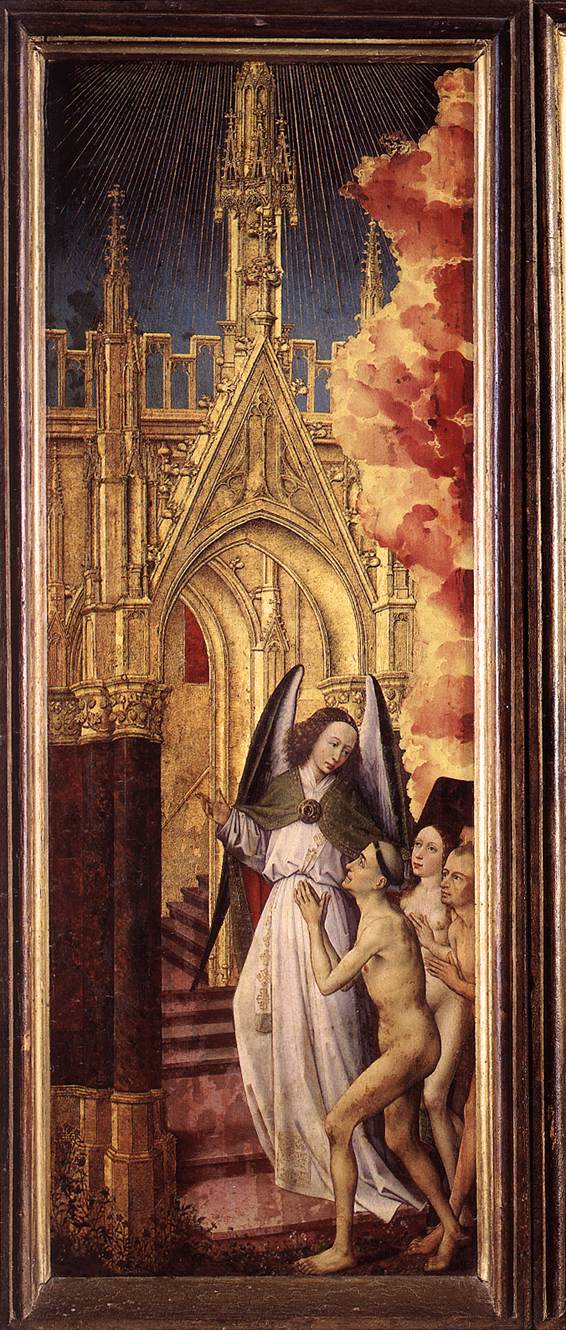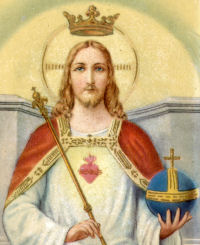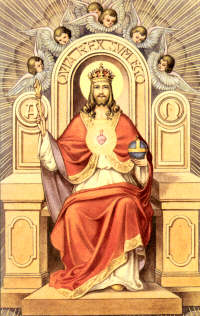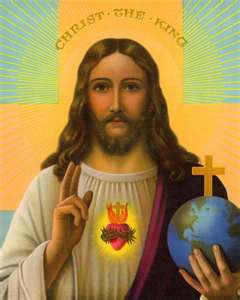Christ has received the authority and glory of a king; every people, tribe and nation will serve Him forever - Antiphon, Evening Prayer I
“If to Christ our Lord is given all power in heaven and on earth; if all men, purchased by his precious blood, are by a new right subjected to his dominion; if this power embraces all men, it must be clear that not one of our faculties is exempt from his empire. He must reign in our minds, which should assent with perfect submission and firm belief to revealed truths and to the doctrines of Christ. He must reign in our wills, which should obey the laws and precepts of God. He must reign in our hearts, which should spurn natural desires and love God above all things, and cleave to him alone. He must reign in our bodies and in our members, which should serve as instruments for the interior sanctification of our souls, or to use the words of the Apostle Paul, as instruments of justice unto God.[35] If all these truths are presented to the faithful for their consideration, they will prove a powerful incentive to perfection.”
— Pope Pius XI – Quas Primas (§34)
During the Jubilee Year observing the 16th centenary of the Council of Nicea, Pope Pius XI issued an encyclical, Quas Primas, by which he established the feast of Christ the King as a celebration of the universal Church to be observed each year on the last Sunday of the Church’s liturgical year, before the first Sunday of Advent.
In this encyclical, issued December 11, 1925, Pope Pius recounts biblical and traditional sources affirming the sovereignty of Christ, and he also explains the need for such a liturgical celebration in the entire Church in the contemporary world.
Link – http://www.vatican.va/holy_father/pius_xi/encyclicals/documents/hf_p-xi_enc_11121925_quas-primas_en.html
Canticle Revelation 4:11; 5:9-12
Worthy are you, our Lord and God,
to receive glory and honor and power,
for you created all things,
and by your will they existed and were created.
Worthy are you, O Lord,
to take the scroll and to open its seals,
for you were slain,
and by your blood you ransomed men for God
from every tribe and tongue and people and nation.
You have made us a kingdom and priests to our God,
and we shall reign on earth.
Worthy is the Lamb who was slain,
to receive power and riches
and wisdom and might,
and honor and glory and blessing.
Collect
Almighty and merciful God, who breaks the power of evil and makes all things new in your Son Jesus Christ, the King of the universe: May all in heaven and earth acclaim your glory and never cease to praise you.
We ask this through our Lord Jesus Christ, your Son, Who lives and reigns with you and the Holy Spirit, one God, for ever and ever. Amen.
Scripture Readings
Year A
First Reading: Ezekiel 34:11-12; 15-17
For thus says the Lord GOD: Behold, I, I myself will search for my sheep, and will seek them out. As a shepherd seeks out his flock when some of his sheep have been scattered abroad, so will I seek out my sheep; and I will rescue them from all places where they have been scattered on a day of clouds and thick darkness.
I myself will be the shepherd of my sheep, and I will make them lie down, says the Lord GOD. I will seek the lost, and I will bring back the strayed, and I will bind up the crippled, and I will strengthen the weak, and the fat and the strong I will watch over; I will feed them in justice. As for you, my flock, thus says the Lord GOD: Behold, I judge between sheep and sheep, rams and he-goats.
Second Reading: 1 Corinthians 15:20-26,28
But in fact Christ has been raised from the dead, the first fruits of those who have fallen asleep. For as by a man came death, by a man has come also the resurrection of the dead. For as in Adam all die, so also in Christ shall all be made alive. But each in his own order: Christ the first fruits, then at His coming those who belong to Christ. Then comes the end, when He delivers the kingdom to God the Father after destroying every rule and every authority and power. For He must reign until He has put all His enemies under His feet. The last enemy to be destroyed is death.
When all things are subjected to Him, then the Son Himself will also be subjected to Him who put all things under Him, that God may be everything to every one.
Gospel: Matthew 25:31-46
"When the Son of man comes in His glory, and all the angels with Him, then He will sit on His glorious throne. Before Him will be gathered all the nations, and He will separate them one from another as a shepherd separates the sheep from the goats, and He will place the sheep at His right hand, but the goats at the left. Then the King will say to those at His right hand, "Come, O blessed of my Father, inherit the kingdom prepared for you from the foundation of the world; for I was hungry and you gave me food, I was thirsty and you gave me drink, I was a stranger and you welcomed me, I was naked and you clothed me, I was sick and you visited me, I was in prison and you came to me". Then the righteous will answer Him, "Lord, when did we see thee hungry and feed thee, or thirsty and give thee drink? And when did we see thee a stranger and welcome thee, or naked and clothe thee? And when did we see thee sick or in prison and visit thee?" And the King will answer them, "Truly, I say to you, as you did it to one of the least of these my brethren, you did it to me". Then He will say to those at His left hand, "Depart from me, you cursed, into the eternal fire prepared for the devil and his angels; for I was hungry and you gave me no food, I was thirsty and you gave me no drink, I was a stranger and you did not welcome me, naked and you did not clothe me, sick and in prison and you did not visit me". Then they also will answer, "Lord, when did we see thee hungry or thirsty or a stranger or naked or sick or in prison, and did not minister to thee?" Then He will answer them, "Truly, I say to you, as you did it not to one of the least of these, you did it not to me". And they will go away into eternal punishment, but the righteous into eternal life.
Year B
First Reading: Daniel 7:13-14
I saw in the night visions, and behold, with the clouds of heaven there came one like a Son of Man, and He came to the Ancient of Days and was presented before Him. And to Him was given dominion and glory and kingdom, that all peoples, nations, and languages should serve Him; His dominion is an everlasting dominion, which shall not pass away, and His kingdom one that shall not be destroyed.
Second Reading: Revelation 1:5-8
Jesus Christ is the faithful witness, the first-born of the dead, and the ruler of kings on earth. To him who loves us and has freed us from our sins by his blood and made us a kingdom, priests to his God and Father, to him be glory and dominion for ever and ever. Amen. Behold, he is coming with the clouds, and every eye will see him, every one who pierced him; and all tribes of the earth will wail on account of him. Even so. Amen.
"I am the Alpha and the Omega," says the Lord God, who is and who was and who is to come, the Almighty.
Gospel: John 18:33-37
Pilate entered the praetorium again and called Jesus, and said to Him, "Are you the King of the Jews?" Jesus answered, "Do you say this of your own accord, or did others say it to you about Me?" Pilate answered, "Am I a Jew? Your own nation and the chief priests have handed you over to me; what have you done?" Jesus answered, "My kingship is not of this world; if my kingship were of this world, my servants would fight, that I might not be handed over to the Jews; but my kingship is not from the world." Pilate said to him, "So you are a king?" Jesus answered, "You say that I am a king. For this I was born, and for this I have come into the world, to bear witness to the truth. Every one who is of the truth hears my voice."
Year C
First Reading: 2 Samuel 5:1-3
In those days, all the tribes of Israel came to David at Hebron, and said, "Behold, we are your bone and flesh. In times past, when Saul was king over us, it was you that led out and brought in Israel; and the LORD said to you, 'You shall be shepherd of my people Israel, and you shall be prince over Israel.'" So all the elders of Israel came to the king at Hebron; and King David made a covenant with them at Hebron before the LORD, and they anointed David king over Israel.
Second Reading: Colossians 1:12-20
Giving thanks to the Father, who has qualified us to share in the inheritance of the saints in light. He has delivered us from the dominion of darkness and transferred us to the kingdom of his beloved Son, in whom we have redemption, the forgiveness of sins.
He is the image of the invisible God, the first-born of all creation; for in him all things were created, in heaven and on earth, visible and invisible, whether thrones or dominions or principalities or authorities--all things were created through him and for him. He is before all things, and in him all things hold together. He is the head of the body, the church; he is the beginning, the first-born from the dead, that in everything he might be pre-eminent. For in him all the fulness of God was pleased to dwell, and through him to reconcile to himself all things, whether on earth or in heaven, making peace by the blood of his cross.
Gospel: Luke 23:35-43
The rulers scoffed at him, saying, "He saved others; let Him save Himself, if He is the Christ of God, His Chosen One!" The soldiers also mocked Him, coming up and offering Him vinegar, and saying, "If you are the King of the Jews, save yourself!" There was also an inscription over Him, "This is the King of the Jews."
One of the criminals who were hanged railed at Him, saying, "Are you not the Christ? Save Yourself and us!" But the other rebuked him, saying, "Do you not fear God, since you are under the same sentence of condemnation? And we indeed justly; for we are receiving the due reward of our deeds; but this Man has done nothing wrong." And he said, "Jesus, remember me when You come into Your kingdom." And He said to him, "Truly, I say to you, today you will be with Me in Paradise."





 The liturgy is an album in which every epoch of Church history immortalizes itself. Therein, accordingly, can be found the various pictures of Christ beloved during succeeding centuries. In its pages we see pictures of Jesus suffering and in agony; we see pictures of His Sacred Heart; yet these pictures are not proper to the nature of the liturgy as such; they resemble baroque altars in a gothic church. Classic liturgy knows but one Christ: the King, radiant, majestic, and divine.
The liturgy is an album in which every epoch of Church history immortalizes itself. Therein, accordingly, can be found the various pictures of Christ beloved during succeeding centuries. In its pages we see pictures of Jesus suffering and in agony; we see pictures of His Sacred Heart; yet these pictures are not proper to the nature of the liturgy as such; they resemble baroque altars in a gothic church. Classic liturgy knows but one Christ: the King, radiant, majestic, and divine. 


.jpg)